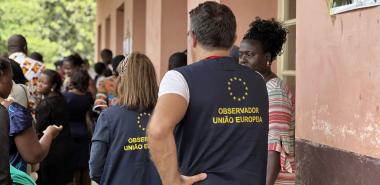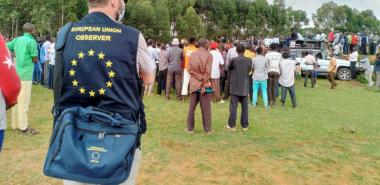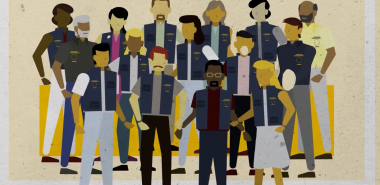EU Election Observation Missions
The EU is a globally recognised and credible actor in international election observation. Since 2000, the EU has deployed over 180 Election Observation Missions (EOMs) in more than 65 countries.
Support to democracy worldwide is consistent with the European Union’s fundamental principles: it is also our clear interest and a crucial tool for our foreign policy. Only a functioning democracy can address its citizen’s needs, meet their demands and fulfil their aspirations. EU Election Observation Missions enhance our engagement with partner countries, including in support of their efforts to fulfil their international human rights obligations.
Electoral observation is not just the task of one day: the quality of the electoral process has to be continuously reassessed and improved. A democratic election is incomplete without a level playing field, fair competition between candidates, freedom of expression, of assembly and association, the respect for human rights and a neutral and independent election management body. A vibrant civil society and diverse media landscape are also essential pre-requisites.
The European Union deploys EOMs to countries all around the world, with the exception of the regions covered by the Organization for Security and Co-Operation in Europe (OSCE). In the EU Member States, election processes are observed by the OSCE.
На цій сторінці
- Why election observation is important?
- How does the EU observe elections?
- Composition of Election Observation Missions
- Methodology of Election Observation Missions
- Procedures
- Focal points
- European Union Database on Election Missions
- Election Observation and Democracy Support to EU EOMs
- List of EU EOM missions 2022 - 2024
- Related Press
- Related Stories
In Focus
Why election observation is important?
An effective democratic system needs regular, inclusive, transparent and credible elections. This is why EU Election Observation Missions (EOMs) and the election assistance programmes are a fundamental part of European Union’s action to promote democracies, human rights and civil society participation worldwide. The EOMs are the concrete manifestation of EU's commitment in this respect. The images of voters getting out of the polls – their forefingers marked with dark ink – have generated great hopes in many countries around the world.
The immediate goals of EU Election Observation Missions are to:
- strengthen public trust in the elections,
- encourage civic participation
- deter fraud, and
- provide an informed, impartial and factual assessment of an election process.
The long-term objectives aim to:
- improve the overall electoral framework and the context in which elections are held;
- strengthen the independence and accountability of state institutions;
- enhance the resilience of partner countries by supporting good governance;
- mitigate the potential election-related conflict.
Strong democratic institutions are vital to improve a country’s resilience: they can help prevent the next crisis, stabilise a war-torn area or defuse tensions.
How does the EU observe elections?
Through the years, the EU has built up a strong legacy as a reliable partner for democratic consolidation. Several mission formats are at the EU’s disposal, from full-fledged Election Observation Missions (EOMs), to smaller technical Election Experts Missions (EEMs), and post-EOM Election Follow-up Missions (EFMs).
EU EOMs, EEMs and EFMs are, at the invitation of the host country, a highly visible demonstration of the EU’s commitment to supporting democratisation and promoting human rights broadly. They provide a comprehensive, independent and impartial assessment of an electoral process according to international and regional standards for democratic elections.
An Election Observation Mission assesses all aspects of the electoral process, including:
- its legal framework
- the equality of the vote
- the registration of voters and candidates
- the training of election staff
- voter education
- media coverage
- digital space
- use of new technologies
- the campaign
- the preparations for the vote
- the appeals process
EU EOMs follow a long-term observation methodology, with Core Team experts and long-term observers arriving in the country several weeks before Election Day and remaining afterwards to follow counting and tabulation. On Election Day, observers visit polling stations to assess the opening, voting, counting and aggregation of results. The observation is conducted according to the principles of independence, full coverage, impartiality, transparency, professionalism and non-interference in the process.
In its final report, the EU EOM offers recommendations to improve the integrity and effectiveness of future electoral processes and the wider process of democratisation.
EOM’s recommendations focus on a wide range of issues. From human rights, democratic institutions, freedom of the media to active and engaged Civil Society Organisations and an independent judiciary system to mention just a few.
EU Election Experts Missions (EEMs) are composed of two or more independent experts deployed for a period of approximatively two months during a country’s electoral process. Due to the scope, the size and the limited resources, these missions differ from EOMs as they are of an exclusively technical nature, have no public visibility and cannot undertake comprehensive observation. The experts assess impartially whether the electoral process is conducted in line with international, regional and national obligations on the conduct of democratic elections. They submit a final report to the national authorities with recommendations to improve the electoral framework.
EU Election Follow-up Missions (EFMs): In the long term, the European Union and Member States systematically follow-up on the implementation of the recommendations made by EOMs. The follow-up to EOM recommendations is an integral part of EU’s political dialogue with partner countries and informs governance and electoral assistance projects.
For this purpose, the EU deploys EFMs to assess and report on the implementation of EOM recommendations and any relevant electoral reform initiatives undertaken. An EFM can also contribute to deepen dialogue and inject momentum for electoral reforms. The timing for the deployment of EFMs are adjusted to the electoral cycles and specific circumstances of the country. They are generally deployed mid-way through the electoral cycle.
More information on election assistance is available on the European Commission website on International Partnerships (INTPA) and Election Observation and Democratic Support (EODS) Website.
Composition of Election Observation Missions
European Election Observation Missions are deployed at the express invitation of the host country, are led by a Chief Observer and are composed of a Core Team (composed of a Deputy Chief Observer and several electoral experts) as well as long-term and short-term observers.
- The Chief Observer is a member of the European Parliament and has the overall responsibility for the mission, including of the Preliminary Statement and of the Final Report. They are present in the country at key moments of the mission.
- Core Team experts support with the Chief Observer in formulating the analytical framework for the mission. To this end, they carry out specific tasks such as analysing the electoral, legal and political aspects; monitoring the online and offline media; and managing the observers’ work. Core Team experts are specialised in legal issues, election administration, human rights and gender issues, security, logistics, media and social media monitoring. They have professional experience in election observation and are recruited via specific calls for applications.
- Long-term observers (LTOs) are generally deployed throughout the host country around one month before Election Day. They observe the unfolding electoral campaign, the conduct of the Election Day and the post-election developments. They also oversee particular issues, such as the use of public resources by candidates during campaigning, human rights issues such as freedom of assembly, freedom of speech and the participation of women and vulnerable groups in the electoral process. After Election Day, LTOs remain in the field to observe the resolution of any electoral disputes.
- Short-term observers (STOs) are deployed to observe the polling day and the early counting of ballots. Both LTOs and STOs are deployed in teams of two and their work is closely interlinked. LTOs report regularly on their observations and prepare the STOs work in their area.
The EU engages a Service Provider to hire supporting staff, including project managers, security officers, drivers, translators, and IT professionals. The Service Provider assumes responsibility for providing intricate logistical and security support to effectively manage the mission on a day-to-day basis.
Methodology of Election Observation Missions
The strength and added-value of EU election observation missions lie in their robust and comprehensive methodology, which is the warrant of their credibility. EU EOMs assess the electoral process on the basis of international, regional and national election standards. This methodology is uniformly applied to all the electoral processes observed by the EU.
The fundamental principles of independence, impartiality, consistency, long-term approach and professionalism are set out in the 2000 Communication from the European Commission on EU election assistance and observation. They cover all phases of the election cycle: pre-election, election day, and immediate post-election. EU EOMs are present at the invitation of the host country and do not interfere in the organisation of the election itself. Instead, they collect and analyse factual information and provide an independent public assessment of the electoral process.
In 2005, at the United Nations, we endorsed the Declaration of Principles for International Election Observation (DoP). Since then, more than 55 international and regional observer groups have joined in endorsing this document, which has become the golden standard for credible and professional international election observation.
International Election Observers, including EU Observers, share key aspects of observation methodology contained in the DoP. Engaged from the outset in the elaboration of these principles, the EU has recommitted to the Declaration of Principles with the adoption in November 2020 of its third EU Action Plan for Human Rights and Democracy.
EU EOMs are generally deployed in the designated country, following a formal invitation, between 8 to 6 weeks prior to Election Day, starting with the Service Provider and the Core Team experts’ arrival. Long-term observers arrive to assess the preparations for the election at the regional/ local level around 5 to 4 weeks before the voting day. Short-term observers arrive shortly before Election Day to increase the observation capacities of the mission during polling, counting and the tabulation of results.
Regular meetings are held with election officials, political parties, candidates, civil society and media throughout the country.
Observers clearly distinguish between complaints, rumours, accusations and verified facts. Only facts that are witnessed or verified by the observers will be used as the basis of the mission's report. While the mission cooperates with other observer organisations, only information collected by its own international observers is used for the mission's statement and final report.
The assessment of an election is based on the relevant international and regional standards that the country has signed up to, as well as on the national legislation, covering a number of key areas.
Core team experts consider all components of the election process with the support of both long and short-term observers. This enables them to conduct a thorough and comprehensive assessment of the overall administration of the elections as well as the degree of freedom and access granted to candidates, voters and the media.
A Preliminary Statement is then presented by the Chief Observer at a press conference, usually 48 hours after Election Day. This statement is based on the observation of the entire process up to the voting.
The Final Report contains the EOM's overall assessment of the electoral process and recommendations for the improvement of future electoral processes. It is delivered to national authorities and stakeholders, and made public during the Return Visit of the Chief Observer around two months after the EOM has left the country.
Procedures
Selection of priority countries
Based on invitations received from countries and recommendations from geographical units within the EEAS, the High Representative decides on the annual priorities and on the missions to be deployed, after consultation with both Member States and the European Parliament.
The criteria for deciding which elections to observe include:
- Consistency with the EU policy in the country, particularly regarding structured and continued support to democratisation;
- Added-value of an EU EOM to an electoral process, by increasing voters’ confidence and enhancing transparency;
- Follow-up to previous electoral observation missions.
Exploratory mission
An Exploratory Mission (ExM) is sent to the country to assess whether deploying an EOM is useful, advisable and feasible. The Mission is composed of at least four experts who will meet with a wide range of stakeholders such as local authorities, electoral management body, civil society groups, and media outlets. The ExM also advises on the conditions that must be fulfilled by the host authorities for an EOM to be able to operate fully and credibly. An Administrative Arrangement(s) is also discussed with the Ministry of Foreign Affairs and the Election Management Body to be agreed on and signed before the deployment of the EOM.
Selection of the Chief Observer, Core Team Experts and Observers
After deciding to deploy a mission, the High Representative appoints a Chief Observer, a Member of the European Parliament (MEP). The experts of the EOM Core Team are selected, based on their experience, from a pool of experts that the European Commission has compiled, following a call for interest published on its website.
Long and short-term observers are appointed by the European Commission and the EEAS from a selection of candidates proposed by EU Member States. The European Parliament may also decide to send a delegation of MEPs to observe the elections. The parliamentary delegation is integrated into the EOM. Working closely with the Chief Observer, it endorses the EOM findings and conclusions.
Focal points
Core Team
Core Team experts are selected from a pool of experts compiled by the European Commission following a call for interest published on its website. You can find more information on how to join an EU EOM including the criteria for recruitment and training requirements here.
Long Term Observers (LTO)/Short Term Observers (STO)
Each EU Member State has a Focal Point for matters related to election observation. They are part of their national Ministry of Foreign Affairs or of a related external agency. Focal Points are responsible for the recruitment and proposal of their own country’s candidates for selection as Short and Long-Term Observers to EU Election Observation Missions.
Norway, Switzerland and Canada have bilateral arrangements with the EU to send observers to EOMs and therefore also have Focal Points for election observation.
Read more:
European Union Database on Election Missions
The European Union Database on Election Missions provides public access to a central repository of the recommendations issued by EOMs since 2016. Recommendations can be searched by year, region/country, type of mission, type of election and type of recommendation. Final reports of EOMs, preliminary statements and press releases since 2000 as well as reports of EU Election Follow-up Missions can also be found in this database.
Learn more:
Election Observation and Democracy Support to EU EOMs
Election observation is a concrete example of EU’s commitment to supporting democracy and promoting human rights around the world. To this end, the Election Observation and Democracy Support (EODS) III Project, funded by the European Commission, is dedicated to strengthening EOMs capacity in five key areas:
- Strengthening missions’ methodology
- Building capacity to assess the impact of social media on elections
- Coordinating the communication strategy for EU election missions
- Training election observation specialists, and
- Developing tools for the operational support of EU election observation.
Learn more about the complex work behind the scenes Election Observation and Democracy Support (EODS)
Further information
- Handbook for European Union Election Observation
- Brochure "Beyond Election Day: Best practices for follow-up to EU Election Observation Missions" (June 2017)
- High-Level Conference on the Future of International Election Observation
- Code of Conduct for EU Election Observers
- Declaration of Principles for International Election Observation
- Compendium of International Standards for Elections
- Evaluation of EU Election Observation Activities
- How to become an Election Observer
- European Parliament Elections Observation - Overview
- FPI Election Observations, what we do
- EOM YouTube Channel
- “Election Observation and Democracy Support - EODS” Project
- List of EU EOM and EEM missions 1993 - 2021 (Archived websites)
Follow the Official Facebook page of the European Union Election Observation Missions to access the central hub for all communication on EOMs deployed on the ground and the Official EU EOMs YouTube channel where you can see videos from different missions around the world.




























